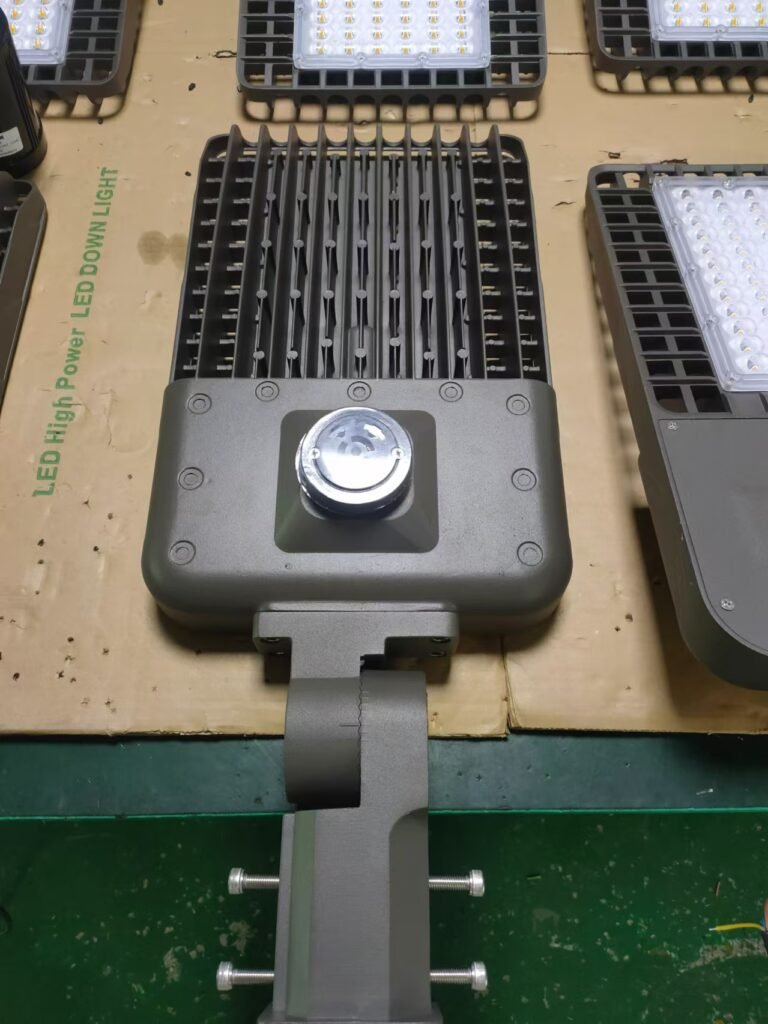1.1Introduction
Efficient and intelligent lighting solutions are becoming increasingly essential in modern parking lots. Traditional lighting systems remain fully illuminated throughout the night, consuming excessive energy and inflating operational costs. As cities and businesses strive for sustainable development and cost savings, motion-sensor streetlights have emerged as a forward-thinking choice. By activating only when motion is detected, these systems curb energy waste, reduce expenses, and enhance overall safety.
According to a 2020 U.S. Department of Energy study, parking lot lighting accounts for nearly 10% of total outdoor lighting electricity consumption in commercial and industrial sectors, indicating a substantial energy and cost burden. U.S. Department of Energy (2020) – Estimated Outdoor Lighting Usage (Hypothetical Example)
Furthermore, the International Dark-Sky Association suggests that inefficient outdoor lighting contributes to excessive carbon emissions and light pollution, reinforcing the value of smarter lighting systems like motion-sensor fixtures.== International Dark-Sky Association – On the Effects of Poor Outdoor Lighting (Hypothetical Example)

2.0 Benefits of Motion-Sensor Streetlights
2.1 Energy Efficiency
Motion-sensor streetlights operate only when vehicles or pedestrians are present, drastically cutting unnecessary energy consumption. For example, an underground parking garage observed a 40% decrease in electricity usage after installation, while a Tokyo commercial center reported annual savings exceeding 500,000 RMB. In comparison, traditional streetlights remain lit all night, wasting energy and inflating bills. The Benefits of Motion Sensor Parking Lot Light, What Are the Benefits of Motion Sensor Parking?
2.2 Enhanced Security
Immediate illumination triggered by motion detection discourages criminal activities and improves visibility.A New York City commercial complex saw fewer thefts and vandalism incidents, while a Shanghai facility reported a 25% reduction in nighttime accidents. Such instant response not only deters wrongdoing but also aids security personnel. Advantages of Street Light Motion Sensors, Street Light Motion Sensor

2.3 Cost Savings
By cutting down on unnecessary lighting hours, motion-sensor systems significantly reduce electricity costs. One logistics firm saved 30% annually, and a Guangzhou tech park cut maintenance and replacement expenses by 40%. Fewer maintenance demands translate to streamlined operations and long-term financial benefits. Should I Use Motion Sensors in LED Parking Lot Lights
2.4 Environmental Sustainability
Lower energy use leads to fewer carbon emissions, aligning with sustainable urban development and eco-friendly initiatives.London’s adoption of motion-sensor streetlights aims to save thousands of tons of CO₂ annually. Similarly, an eco-park in Shenzhen enhanced its environmental profile through these green solutions. How Do Solar Street Lights Implement the Motion Sensor Function
2.5 Increased Lifespan of Lighting Fixtures
Operating only when needed reduces wear and tear on LED bulbs, extending their lifespan and minimizing replacement costs. A large shopping center halved its bulb replacement frequency, and a premium Beijing residential area extended lighting equipment life by two years on average. Street Light Motion Sensor, How Do Solar Street Lights Implement the Motion Sensor Function
3.0 Implementation Considerations
3.1 Installation Flexibility
Motion-sensor lighting integrates smoothly with existing infrastructures or new installations.== A historic building’s parking lot in San Francisco retained its original lamp posts, while an older Guangzhou lot upgraded without major renovations. Should I Use Motion Sensors in LED Parking Lot Lights, How to Choose the Motion Sensor Street Light

3.2 Technological Advancements
Different sensor technologies—such as PIR, microwave, or radar—cater to various environments and performance requirements. Indoor garages often opt for PIR, while outdoor lots may prefer microwave sensors. A German multi-level garage combined infrared and microwave sensors, and some South Korean facilities now use radar-based systems for enhanced accuracy. Advantages of Street Light Motion Sensors, Motion Detector Street Lights
4.0 Q&A Section
1. How to find the best streetlight suppliers in China?
Check out this comprehensive guide to sourcing the best outdoor lighting suppliers in China for practical tips and insights.
2. Which type of lighting system is best for parking lots?
Explore the best lighting solutions for parking lots and their ideal LED configurations.
3. How to calculate ideal lighting for your parking lot?
Refer to this step-by-step guide on calculating the perfect LED lighting for your parking lot.
4. What is the importance of color temperature in parking lot lighting?
Learn more in this article on choosing the best color temperature for parking lot lighting.
5. What certifications are important for streetlights?
Check this complete guide to streetlight certifications and standards to ensure compliance and quality.
5.0 Conclusion
Motion-sensor streetlights offer a compelling, forward-looking solution for modern parking lots, reducing energy waste, strengthening security, cutting costs, minimizing environmental impact, and extending equipment life. Real-world examples—from Tokyo to New York and London to Shanghai—underline their reliability and adaptability. As municipalities and businesses seek cost-effective, sustainable approaches to lighting, motion-sensor systems represent a clear and impactful choice. Why Smart Street Lights Solutions: Need for Smart Cities
For more insights, visit our official website or explore our smart streetlight solutions.

